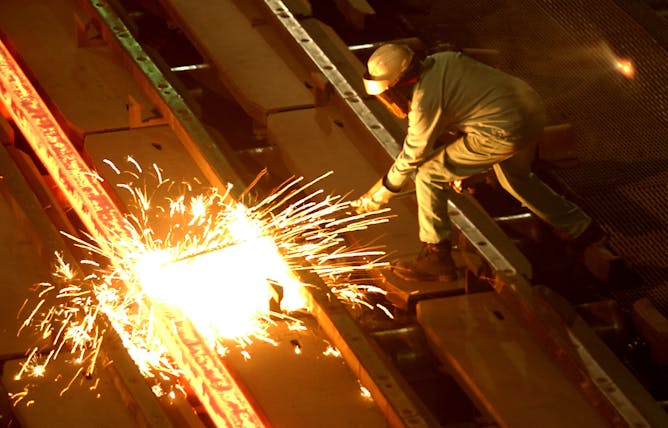|
The iron and steel industry produces about 11% of global carbon emissions. Since it relies on high heat and typically coal, it’s also one of the toughest products in the world to decarbonize in the effort to slow climate change.
The EU and U.S. both have innovative tariff proposals designed to bring down those emissions, but they are taking vastly different approaches. The result could end up stoking trade tensions that are already running hot over new U.S. clean tech subsidy rules, explain energy and climate policy veterans Noah Kaufman, Sagatom Saha, Chris Bataille and Gautam Jain. Without creative compromises, the two approaches could end up undermining one another, they
write.
|

Noah Kaufman, Columbia University; Chris Bataille, Columbia University; Gautam Jain, Columbia University; Sagatom Saha, Columbia University
Both sides have reason to find common ground, says a group of energy and climate policy analysts.
|
Quote of the week 💬
|
-
“Some research shows staff are often too stressed to take time to make healthy food choices at work. One way of stopping this is to ensure that there are options for staff to eat while at work, either on-site or through off-site provision."
– Martin Caraher, professor of food and health policy at City, University of London, from his story Why eating at work is important – even the odd slice of cake
|
|
Business
|
-
Robert Crammond, University of the West of Scotland
Four things you should consider before launching a startup with your university friends.
-
Rehana Cassim, University of South Africa
Directors should avoid accepting more directorships than they can handle.
|
|
Economy
|
-
Sam Polzin, Purdue University; Jayson Lusk, Purdue University
A little more than 1 in 10 Americans can’t get enough to eat – around the same share of the country that was experiencing food insecurity before the COVID-19 pandemic.
|
|
Technology
|
-
Ming Du, Durham University
Chinese tech giant Huawei is among companies adopting new strategies to challenge national security reviews.
|
|
Inequality
|
-
Carl Rhodes, University of Technology Sydney; Alison Pullen, Macquarie University; Celina McEwen, University of Technology Sydney
If diversity programs are to truly benefit Australia’s most disadvantaged groups, such as Indigenous people, more acknowledgement must be given to class and ‘intersectionality’.
|
|
Workers
|
-
Paul Whiteley, University of Essex
Recent price rises are not due to higher wages but supply-side issues including the war in Ukraine, the COVID pandemic and Brexit.
|
|